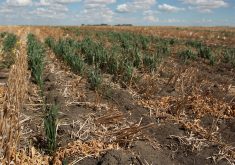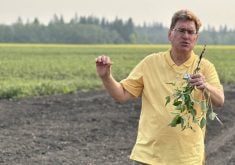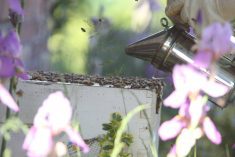Ian Boxall says the drought is far from over and producers, particularly those who raise livestock, will be in tough shape without rain
Tisdale, Sask.-area farmer Ian Boxall was elected president of the Agricultural Producers Association of Saskatchewan last week.
He takes the helm from Todd Lewis of Gray, who was president for six years.
The new executive also includes vice-presidents Bill Prybylski of Willowbrook and Scott Owens from Maidstone.
Boxall operates a grain and oilseeds farm north of Tisdale with his family. He is reeve of the rural municipality of Connaught and was APAS vice-president for six years.
“I believe in APAS. I believe in the work that we do,” he said in an interview. “Having a united voice is important.”
Read Also

New coal mine proposal met with old concerns
A smaller version of the previously rejected Grassy Mountain coal mine project in Crowsnest Pass is back on the table, and the Livingstone Landowners Group continues to voice concerns about the environmental risks.
A first priority is to advocate for farmers during development of the next farm program framework, which is expected to be signed by federal and provincial agriculture ministers at their July meeting in Saskatoon.
Boxall also said the drought is far from over and producers, particularly those who raise livestock, will be in tough shape without rain.
“We’ve got three feet of snow but we still need spring rain,” he said.
Making sure all producers have access to good programs is another priority.
In his address to the APAS meeting, agriculture minister David Marit thanked APAS for its advocacy, saying it was among a “trusted group of grassroots stakeholders” that can offer valuable insight to the government.
“This perspective really helps me to inform sound proactive policy decisions and are invaluable as we move forward with improvement to our suite of business risk management programs,” he said.
Marit’s comments come after a public spat last month when the provincial finance ministry blamed the government’s deficit on the drought and crop insurance payments, and a subsequent letter suggested farmers might not be able to count on the province to help them in future.
Marit said $2.4 billion in claims will be paid this year, leaving a surplus of $1.3 billion in the crop insurance fund.
“Compare that to when we took office when Saskatchewan crop insurance was $173 million in debt,” he said. “What I’m saying to you, ladies and gentlemen, is that you can be confident that as long as we have the honour of forming government that Saskatchewan crop insurance will be well-funded, well-managed and will be there in the future to support our producers.”
Marit noted that in the last five years more than $427 million has been paid to producers through AgriStability. The removal of the reference margin limit increased 2020 benefits by $7 million.
Livestock price insurance has paid $17.6 million in the calf program, $7 million to participants in the fed cattle program, and $4.7 million to those in the feeder program since 2014.
He also told them that so far, 10,900 first payment applications through the Canada-Saskatchewan Drought Response Initiative for livestock producers this year had been received, paying out $141.5 million.
“Approximately 5,100 payment two applications are received to date, paying out an additional $66.8 million,” he said.
Marit and others also expressed thanks to Lewis for his work as president.
Lewis has been filling in as second vice-president at the Canadian Federation of Agriculture and plans to seek election to that position at the organization’s annual meeting in March.


















